
The Hotel Chelsea is a hotel at 222 West 23rd Street in the Chelsea neighborhood of Manhattan in New York City. Built between 1883 and 1884, the hotel was designed by Philip Hubert in a style described variously as Queen Anne Revival and Victorian Gothic. The 12-story Chelsea, originally a housing cooperative, has been the home of numerous writers, musicians, artists, and entertainers, some of whom still lived there in the 21st century. As of 2022, most of the Chelsea is a luxury hotel. The building is a New York City designated landmark and on the National Register of Historic Places.

Mailbox Birmingham is a mixed-use development located within the city centre of Birmingham, England. It houses British luxury department store chain Harvey Nichols, and the BBC Birmingham studios.

Howard Chandler Christy was an American artist and illustrator. Famous for the "Christy Girl" – a colorful and illustrious successor to the "Gibson Girl" – Christy is also widely known for his iconic WWI military recruitment and Liberty loan posters, along with his 1940 masterpiece titled, Scene at the Signing of the Constitution of the United States, which is installed along the east stairwell of the United States Capitol.
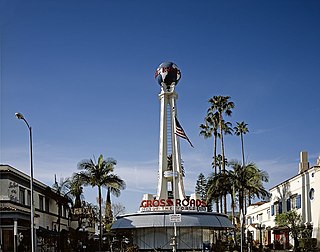
Crossroads of the World is an open-air mall on Sunset Boulevard and Las Palmas in Los Angeles. The mall features a central building designed to resemble an ocean liner surrounded by a small village of cottage-style bungalows. It was designed by Robert V. Derrah, built in 1936, and has been called America's first outdoor shopping mall.

Saint-Germain-des-Prés is one of the four administrative quarters of the 6th arrondissement of Paris, France, located around the church of the former Abbey of Saint-Germain-des-Prés. Its official borders are the River Seine on the north, the rue des Saints-Pères on the west, between the rue de Seine and rue Mazarine on the east, and the rue du Four on the south. Residents of the quarter are known as Germanopratins.

The Carlyle Hotel is a luxury apartment hotel on the Upper East Side of Manhattan in New York City, United States, The hotel is located at 35 East 76th Street, on the eastern side of Madison Avenue between 76th and 77th streets. Opened in 1930, the hotel was designed in the Art Deco style by Sylvan Bien and Harry M. Prince, with interiors designed by Dorothy Draper, and was named after Scottish essayist Thomas Carlyle. The Carlyle has approximately 190 hotel rooms and suites, in addition to 60 cooperative residences.
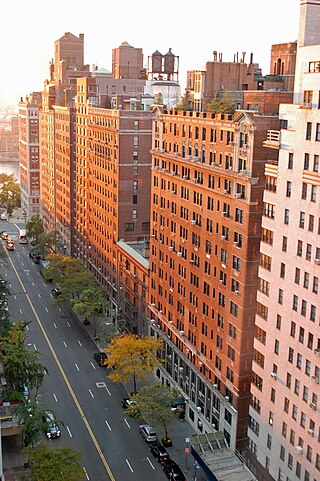
57th Street is a broad thoroughfare in the New York City borough of Manhattan, one of the major two-way, east-west streets in the borough's grid. As with Manhattan's other “crosstown” streets, it is divided into its east and west sections at Fifth Avenue. The street runs from a small park overlooking the East River in the east to the West Side Highway along the Hudson River in the west. 57th Street runs through the Midtown Manhattan neighborhoods of Sutton Place, Billionaire's Row, and Hell's Kitchen from east to west.
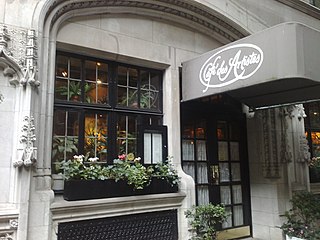
Café des Artistes was a fine restaurant at 1 West 67th Street in Manhattan. New York City. It was owned by George Lang, who closed the restaurant in early August 2009 and announced later that month that the restaurant would remain closed permanently. His wife, Jenifer Lang, had been the managing director of the restaurant since 1990.
Central Park Place is a residential condominium building in the Hell's Kitchen and Midtown Manhattan neighborhoods of New York City. The building is at 301 West 57th Street, at the northwest corner with Eighth Avenue. Davis Brody Bond designed Central Park Place, which is 628 feet (191 m) tall with 56 stories. Central Park Place's facade is made of gray-green glass and aluminum panels, a color scheme intended to associate the building with the nearby Central Park.
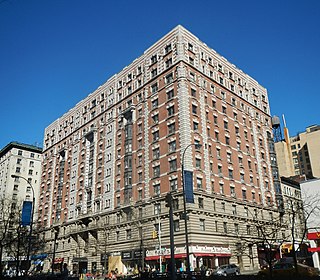
Bretton Hall is a twelve-story residential building at 2350 Broadway, spanning from West 85th to 86th Street on the Upper West Side of Manhattan, New York City.
George Lang was a Hungarian–born American restaurateur, food and travel writer, critic, and journalist.
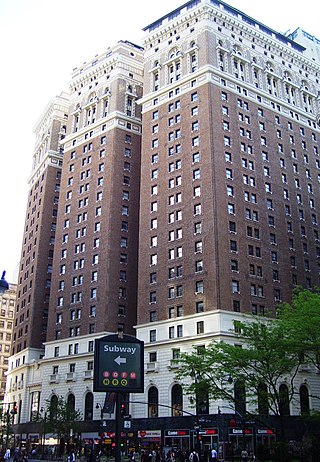
Herald Towers, formerly the Hotel McAlpin, is a residential condominium building on Herald Square, along Broadway between 33rd and 34th Streets, in the Midtown Manhattan neighborhood of New York City. Constructed from 1910 to 1912 by the Greeley Square Hotel Company, it operated as a short-term hotel until 1976. The building was designed by Frank Mills Andrews in the Italian Renaissance style and was the largest hotel in the world at the time of its completion, with 1,500 guestrooms. The hotel was expanded in 1917, when Warren and Wetmore designed an annex with 200 rooms.

Floyd MacMillan Davis was an American painter and illustrator known for his work in advertising and illustration; Walter and Roger Reed described him as "someone who could capture the rich, beautiful people of the 1920s: dashing, mustachioed men; the cool, svelte women. But Davis was just as capable at capturing just-plain-folk, and with a cartoonist's sensibilities and a fresh humor, he expanded into story art and ad work that called characters of every persuasion.
Edith Norman Hyde Robbins Macartney became the first-ever "Miss America" in 1919 in a contest held in New York City. She later became a fortune teller under the pseudonym Pandora.

The Gainsborough Studios, also known as 222 Central Park South, is a residential building on Central Park South, just east of Columbus Circle, in the Midtown Manhattan neighborhood of New York City, United States. Designed by Charles W. Buckham, the building is 16 stories tall with 34 apartments. Named after English painter Thomas Gainsborough, the building is one of several in Manhattan that were built in the early 20th century as both studios and residences for artists.
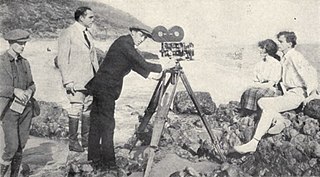
Penrhyn Stanley Adamson, known as Penrhyn Stanlaws, (1877–1957) was a cover artist and film director. Sydney Adamson, who also became an illustrator, was his older brother.

140 West 57th Street, also known as The Beaufort, is an office building on 57th Street between Sixth Avenue and Seventh Avenue in Midtown Manhattan in New York City. It was built from 1907 to 1909 and designed by Pollard and Steinam, who also simultaneously designed the neighboring, nearly identical building at 130 West 57th Street. The buildings are among several in Manhattan that were built in the early 20th century as both studio and residences for artists.
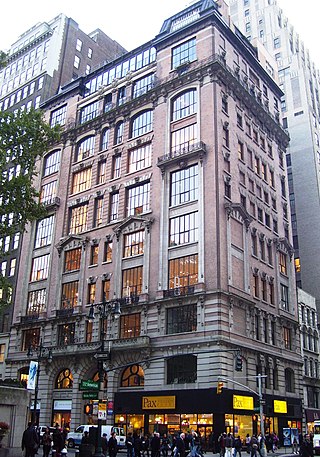
The Bryant Park Studios is an office building at 80 West 40th Street in the Midtown Manhattan neighborhood of New York City, at the corner of 40th Street and Sixth Avenue. The building, overlooking the southwest corner of Bryant Park, was designed by Charles A. Rich in the French Beaux-Arts style. Built from 1900 to 1901 by Abraham A. Anderson, the building is one of several in Manhattan that were built in the early 20th century as both studios and residences for artists.

André Prévot-Valéri was a French painter known for pastoral and coastal landscapes, especially in Normandy, where he spent the last decades of his life. He also published drawings of scenes he witnessed as a soldier during World War I. He was the son of the landscape painter Auguste Prévot-Valéri (1857-1930). Father and son were both recipients of the Prix Rosa-Bonheur.

27 West 67th Street is a cooperative apartment building located near Lincoln Square in the Upper West Side neighborhood of Manhattan, New York City. Completed late in 1902 and opened early the next year, it was designed by an artist named Henry Ward Ranger and financed by an association of his fellow artists. Ranger's innovative design provided for compact duplex apartments conjoined with large north-facing studios. The association was organized as a corporation whose financial structure followed a cooperative model. The corporation built and managed the co-op while its artist-investors held leases for the studio apartments they occupied. The project was an immediate success, leading other artist-investors to finance and build similar studio co-ops nearby. In 1995, following a thorough restoration, the architectural historian Christopher Gray wrote that the building was "one of the most important apartment houses in the history of New York City". As evidenced by the cost of ownership and demand for its studio apartments, the co-op has continued to thrive in the early years of the 21st century.


















